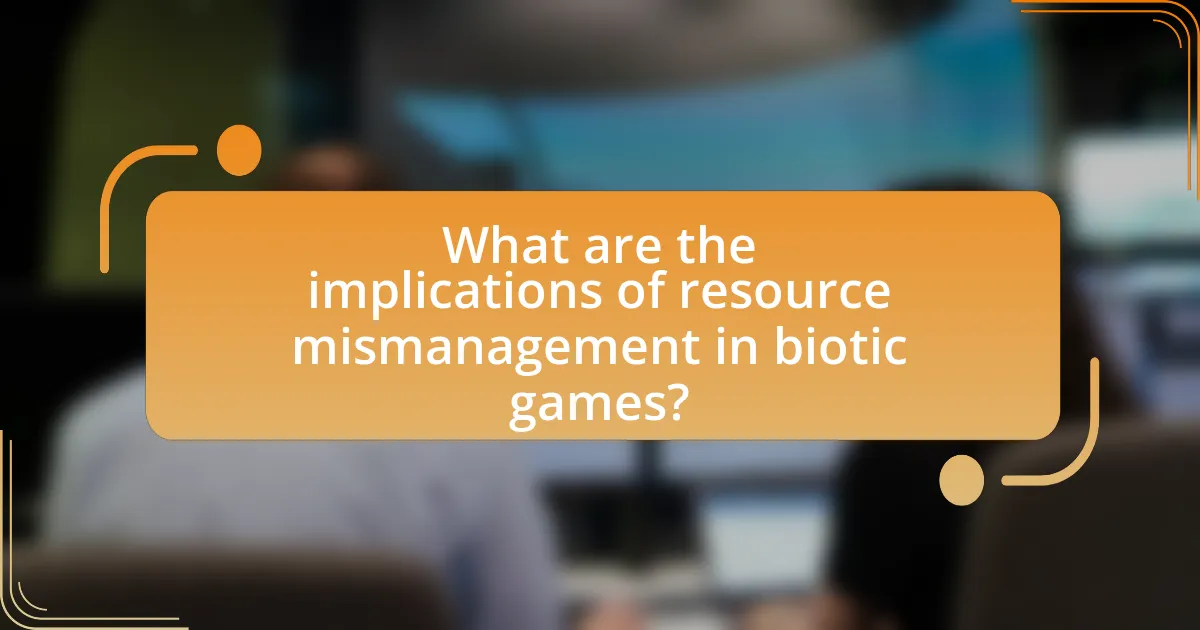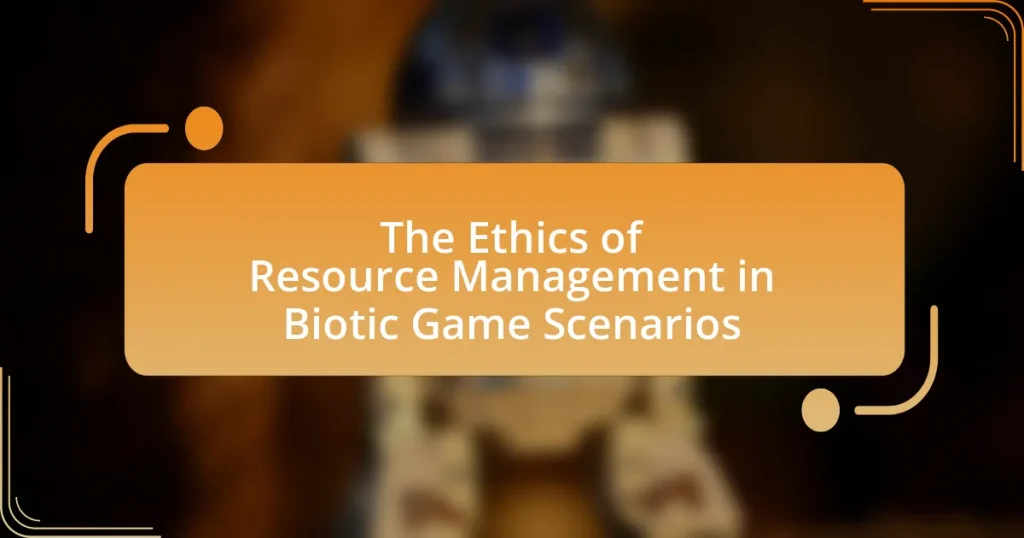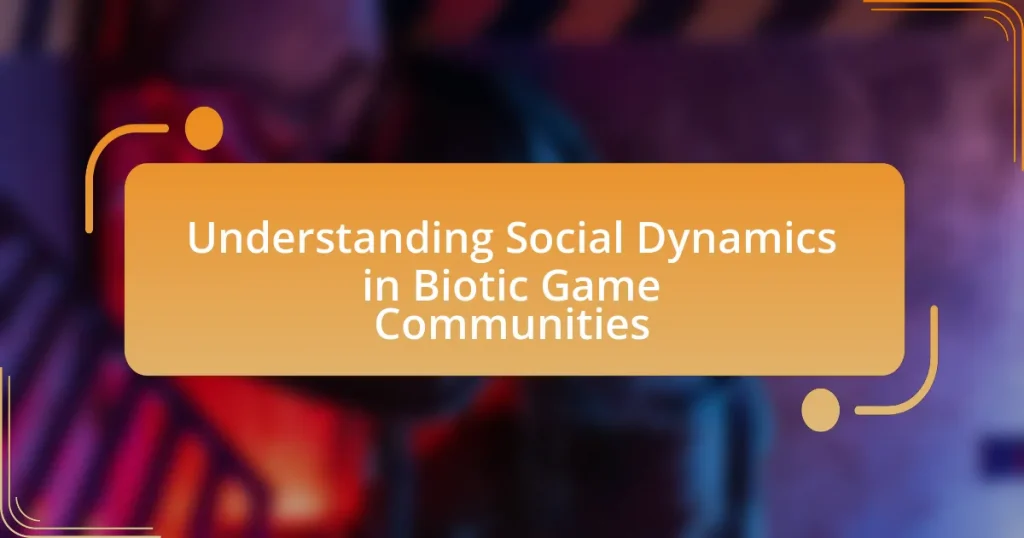The article focuses on the ethics of resource management in biotic game scenarios, emphasizing key considerations such as sustainability, equity, and biodiversity impact. It explores how ethical frameworks like utilitarianism and deontology guide decision-making processes in these games, influencing player behavior and ecological outcomes. The discussion includes the implications of resource mismanagement, the importance of community involvement, and best practices for developers to ensure ethical resource management. Additionally, it highlights practical strategies for players to promote sustainability and minimize resource waste within gameplay.

What are the ethical considerations in resource management within biotic game scenarios?
Ethical considerations in resource management within biotic game scenarios include sustainability, equity, and the impact on biodiversity. Sustainability ensures that resources are used in a way that meets present needs without compromising future generations’ ability to meet theirs. For instance, overharvesting in a game can lead to resource depletion, which is ethically problematic as it threatens the ecosystem’s balance. Equity involves fair access to resources among players, preventing exploitation and ensuring that all participants can benefit from the game’s resources. Additionally, the impact on biodiversity must be considered, as actions taken within the game can affect species diversity and ecosystem health, which are crucial for maintaining ecological integrity. These considerations are essential for creating a fair and responsible gaming environment that reflects real-world ethical dilemmas in resource management.
How do ethical frameworks apply to resource management in biotic games?
Ethical frameworks apply to resource management in biotic games by guiding decision-making processes that balance ecological sustainability with player engagement. These frameworks, such as utilitarianism and deontological ethics, help developers create systems that prioritize the well-being of both virtual ecosystems and players. For instance, utilitarianism encourages maximizing overall happiness by ensuring resources are managed in a way that benefits the majority of players while maintaining ecological balance. Research indicates that games incorporating ethical considerations lead to more responsible player behavior and increased awareness of environmental issues, as seen in titles like “Eco” and “Farming Simulator.” These examples demonstrate that ethical frameworks not only influence gameplay mechanics but also foster a deeper understanding of resource management in real-world contexts.
What are the key ethical theories relevant to resource management?
The key ethical theories relevant to resource management include utilitarianism, deontology, and virtue ethics. Utilitarianism focuses on maximizing overall happiness and minimizing harm, which is crucial in resource allocation decisions to ensure the greatest benefit for the largest number of stakeholders. Deontology emphasizes the importance of rules and duties, guiding resource managers to adhere to ethical principles regardless of the outcomes, thus ensuring fairness and justice in resource distribution. Virtue ethics centers on the character and integrity of the decision-makers, promoting responsible stewardship and sustainable practices in resource management. These theories provide a framework for ethical decision-making in biotic game scenarios, ensuring that resource management aligns with moral values and societal expectations.
How do these theories influence decision-making in biotic games?
Theories of ethics and resource management significantly influence decision-making in biotic games by providing frameworks for evaluating the consequences of actions on ecosystems and species. For instance, utilitarianism encourages players to maximize overall benefits, leading to decisions that prioritize the health of the ecosystem and the well-being of the majority of species involved. In contrast, deontological ethics emphasizes the moral obligations players have towards individual species, which can result in decisions that protect endangered species even at the cost of broader ecological benefits. Research by Hargreaves-Heap and Varoufakis in “Game Theory: A Critical Introduction” illustrates how these ethical frameworks shape strategic interactions and resource allocation in biotic games, ultimately affecting sustainability outcomes.
What role does sustainability play in resource management ethics?
Sustainability is fundamental to resource management ethics as it ensures the responsible use of resources to meet current needs without compromising future generations’ ability to meet theirs. This ethical framework emphasizes the balance between ecological integrity, economic viability, and social equity, guiding decision-makers to consider long-term impacts rather than short-term gains. For instance, the Brundtland Report of 1987 defines sustainable development as development that meets the needs of the present without compromising the ability of future generations to meet their own needs, reinforcing the ethical imperative to manage resources sustainably.
Why is sustainability important in biotic game scenarios?
Sustainability is crucial in biotic game scenarios because it ensures the long-term viability of ecosystems and resources within the game environment. By promoting sustainable practices, players can maintain balance, prevent resource depletion, and enhance biodiversity, which are essential for a thriving game ecosystem. Research indicates that games incorporating sustainability principles lead to more engaging and educational experiences, as they reflect real-world ecological challenges and encourage players to think critically about resource management. For instance, studies show that games designed with sustainability in mind can improve players’ understanding of ecological interdependencies and the consequences of overexploitation.
How can resource management practices promote sustainability?
Resource management practices promote sustainability by optimizing the use of natural resources to ensure their availability for future generations. Effective resource management involves strategies such as conservation, efficient allocation, and sustainable harvesting, which help maintain ecological balance and reduce environmental degradation. For instance, the implementation of sustainable forestry practices can lead to a 30% increase in forest regeneration rates, as evidenced by studies conducted by the Food and Agriculture Organization. This demonstrates that when resources are managed responsibly, ecosystems can thrive, supporting biodiversity and enhancing resilience against climate change.

What are the implications of resource mismanagement in biotic games?
Resource mismanagement in biotic games leads to significant ecological imbalance and player disadvantage. When resources such as food, habitat, or energy are not allocated effectively, it can result in species extinction, reduced biodiversity, and disrupted ecosystems. For instance, in games that simulate ecological systems, improper management can cause a collapse of food chains, ultimately affecting the survival of various species within the game environment. This mirrors real-world scenarios where mismanagement of natural resources has led to habitat destruction and loss of species, as evidenced by studies showing that overexploitation of resources can lead to a 50% decline in biodiversity in affected areas. Thus, the implications of resource mismanagement in biotic games reflect broader environmental concerns and highlight the importance of ethical resource management practices.
What consequences arise from unethical resource management?
Unethical resource management leads to environmental degradation, economic instability, and social inequality. For instance, overexploitation of natural resources can result in habitat destruction and loss of biodiversity, as evidenced by the deforestation rates in the Amazon rainforest, which have increased due to illegal logging practices. Economically, communities dependent on sustainable resources may face poverty and unemployment when those resources are depleted, as seen in regions affected by overfishing. Socially, unethical practices can exacerbate inequalities, as marginalized groups often bear the brunt of resource depletion while wealthier entities benefit, highlighting the need for ethical management to ensure equitable resource distribution and long-term sustainability.
How does resource depletion affect game ecosystems?
Resource depletion negatively impacts game ecosystems by disrupting the balance of species and their habitats. When resources such as food, water, and shelter become scarce, it leads to increased competition among species, resulting in population declines or extinctions. For instance, a study published in the journal “Ecology Letters” found that overexploitation of resources can lead to a 50% reduction in biodiversity within affected ecosystems. This loss of biodiversity further destabilizes the ecosystem, making it less resilient to environmental changes and more susceptible to invasive species. Thus, resource depletion not only threatens individual species but also undermines the overall health and functionality of game ecosystems.
What are the long-term impacts on player engagement and experience?
Long-term impacts on player engagement and experience include increased loyalty, enhanced skill development, and a deeper emotional connection to the game. Research indicates that sustained engagement leads to players investing more time and effort, which fosters a sense of mastery and achievement. For instance, a study by Hamari and Koivisto (2015) found that long-term players often report higher satisfaction levels due to their familiarity with game mechanics and community interactions. Additionally, consistent resource management challenges can create a more immersive experience, as players feel a greater responsibility for their in-game decisions, further solidifying their commitment to the game.
How can ethical lapses in resource management be addressed?
Ethical lapses in resource management can be addressed through the implementation of transparent policies and regular audits. Establishing clear guidelines for resource allocation ensures accountability, while audits help identify and rectify unethical practices. For instance, organizations that adopt sustainability frameworks, such as the Global Reporting Initiative, have shown improved ethical standards in resource management by promoting transparency and stakeholder engagement. This approach not only mitigates ethical lapses but also fosters trust among stakeholders, leading to more responsible resource management practices.
What strategies can be implemented to prevent unethical practices?
Implementing comprehensive training programs on ethical standards is a key strategy to prevent unethical practices in resource management within biotic game scenarios. These programs educate participants about ethical dilemmas, promote awareness of potential misconduct, and establish clear guidelines for acceptable behavior. Research indicates that organizations with robust ethics training report a 50% reduction in unethical behavior (Ethics Resource Center, 2013). Additionally, establishing a transparent reporting system encourages individuals to report unethical practices without fear of retaliation, further reinforcing ethical conduct. Regular audits and assessments of resource management practices can also identify and mitigate risks associated with unethical behavior, ensuring compliance with established ethical standards.
How can player feedback influence ethical resource management?
Player feedback can significantly influence ethical resource management by providing developers with insights into player values and preferences regarding sustainability and fairness. When players express concerns about resource depletion or inequitable distribution within a game, developers can adjust game mechanics to promote more responsible resource management practices. For instance, a study by Hamari and Koivisto (2015) found that player engagement and feedback can lead to improved game design that aligns with ethical considerations, ultimately fostering a more balanced and sustainable gaming environment. This feedback loop encourages developers to prioritize ethical resource management, reflecting the players’ desire for responsible gameplay.

What best practices can be adopted for ethical resource management in biotic games?
Best practices for ethical resource management in biotic games include implementing sustainable harvesting techniques, ensuring biodiversity conservation, and promoting equitable resource distribution. Sustainable harvesting techniques, such as regulated quotas and seasonal restrictions, prevent over-exploitation of resources, which has been shown to maintain ecosystem balance and support long-term viability. Biodiversity conservation practices, like protecting critical habitats and minimizing habitat destruction, are essential for maintaining the ecological integrity of game environments. Furthermore, promoting equitable resource distribution ensures that all stakeholders, including local communities, benefit from resource use, which fosters cooperation and reduces conflicts. These practices are supported by research indicating that ethical resource management leads to healthier ecosystems and more resilient communities.
What guidelines should developers follow for ethical resource management?
Developers should follow guidelines that prioritize sustainability, fairness, and transparency in resource management. These guidelines include implementing resource allocation strategies that minimize waste, ensuring equitable access to resources among players, and providing clear communication about resource mechanics within the game. For instance, studies have shown that games designed with sustainable resource management principles can enhance player engagement and promote environmental awareness, as seen in titles like “Farming Simulator,” which encourages efficient farming practices. By adhering to these guidelines, developers can create a more ethical gaming environment that respects both players and the virtual ecosystems they interact with.
How can transparency enhance ethical practices in resource management?
Transparency enhances ethical practices in resource management by fostering accountability and trust among stakeholders. When resource management processes are transparent, stakeholders can easily access information regarding resource allocation, usage, and decision-making criteria. This openness reduces the likelihood of corruption and mismanagement, as evidenced by studies showing that organizations with transparent practices report higher levels of stakeholder satisfaction and lower instances of unethical behavior. For example, a report by the World Bank indicates that transparency in resource management can lead to improved governance and better outcomes in public service delivery. Thus, transparency serves as a critical mechanism for ensuring ethical standards are upheld in resource management.
What role does community involvement play in ethical resource management?
Community involvement is crucial in ethical resource management as it fosters collaboration, enhances transparency, and ensures that diverse perspectives are considered in decision-making processes. Engaging local communities allows for the identification of sustainable practices that align with cultural values and ecological knowledge, which can lead to more effective resource management strategies. For instance, studies have shown that community-led initiatives in fisheries management have resulted in improved fish stocks and ecosystem health, demonstrating the positive impact of local engagement on resource sustainability.
What practical tips can players use to promote ethical resource management?
Players can promote ethical resource management by implementing sustainable practices such as minimizing waste, prioritizing renewable resources, and collaborating with other players for shared benefits. For instance, players should avoid over-exploitation of resources, which can lead to depletion and imbalance in the game environment. Research indicates that games incorporating resource management mechanics often reflect real-world ecological principles, emphasizing the importance of sustainability. By adopting strategies like recycling in-game materials and engaging in cooperative resource sharing, players can create a more balanced and ethical gaming ecosystem.
How can players advocate for sustainable practices in biotic games?
Players can advocate for sustainable practices in biotic games by actively promoting in-game behaviors that prioritize ecological balance and resource conservation. This can be achieved through community engagement, such as organizing events that highlight sustainable strategies, sharing educational content about the environmental impact of gameplay choices, and collaborating with developers to implement features that reward sustainable practices. For instance, players can encourage the use of renewable resources within the game, which can lead to a more sustainable gaming environment. Research indicates that player-driven initiatives can significantly influence game design and community norms, as seen in games like “Minecraft,” where players have created mods that promote eco-friendly practices.
What actions can players take to minimize resource waste in gameplay?
Players can minimize resource waste in gameplay by implementing strategic planning and efficient resource allocation. By analyzing the game’s mechanics and understanding resource requirements, players can prioritize actions that yield the highest returns on investment. For instance, in survival games, players can gather resources only when necessary and utilize crafting systems to create items that serve multiple purposes, thereby reducing excess consumption. Additionally, players can collaborate with others to share resources, which enhances overall efficiency and reduces individual waste. Research indicates that cooperative gameplay can lead to a 30% reduction in resource depletion compared to solo play, highlighting the effectiveness of teamwork in resource management.



